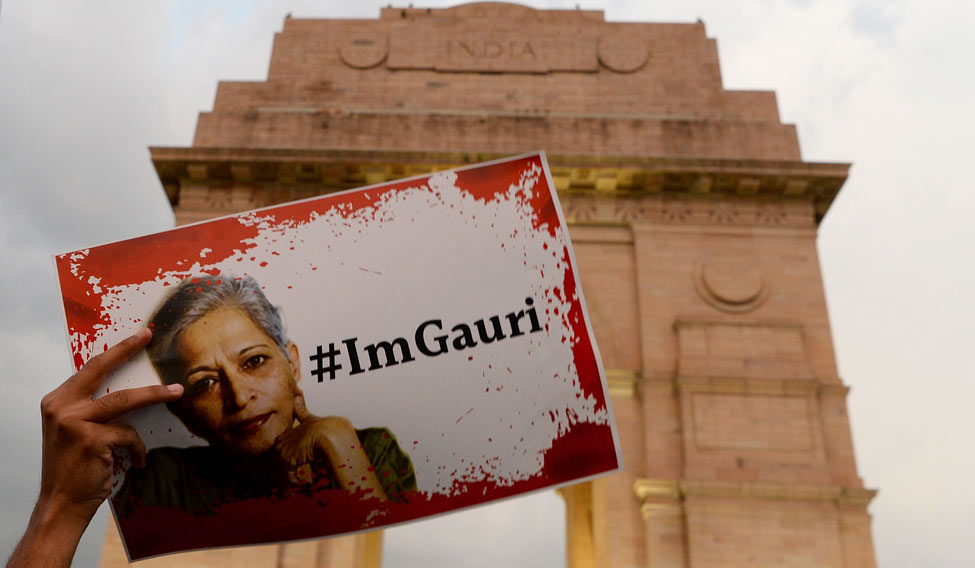Gauri Lankesh was only two or three years old when I first met her, safe and snug in the arms of her father P. Lankesh.
It was during 1964-66, when I was doing MA in English Literature at Bangalore University’s Central College, located in the heart of the city. Lankesh joined the Department of English as a young professor. Though he did not teach the senior classes, including ours, a few of us were close to the radical young writer who had attained fame by then. Relaxing at the college canteen or at bars on the Brigade Road, Lankesh used to talk to us on subjects beyond textbooks.
I had started writing by that time and Lankesh’s advice to me was not about the language or the style of writing, but about the politics of writing, though I could not comprehend everything he said.
Lankesh, who hailed from the Malnad region of Shivamogga district in Karnataka, possessed many characteristics of a rustic farmer. He was fearless; talked straight and was a staunch opponent of caste- and religion-based politics. He was very active in theatre. We teamed up to help him stage his play Rabeendra Rangasaala, which was a reflection of his revolutionary ideas. It was during this time that we visited his rented house in a middle-class locality where we met little Gauri and her mother.
I left Bangalore and when I met Gauri again, she had grown up to be a frock-wearing girl. By then, Lankesh had already started Lankesh Patrike. He passed away when his publication was at the zenith of its glory. What Gauri inherited from her father was his guts, the nerve to speak the truth, an unyielding adherence to democratic and secular values, and the tendency to challenge mainstream powers.
The killings of veteran activists like Narendra Dhabolkar, Govind Pansare and M. Kalburgi and the subsequent annihilation of Gauri in a similar manner, perhaps, indicate that the gun is still the favourite weapon of choice for the fascists ever since the assassination of M.K. Gandhi. This time around, a woman was chosen to be killed in cold blood. (U.R. Ananthamurthy was persecuted even on his deathbed by the fascists forces).
Gauri, 55, who was gunned down by the assailants at her own doorstep, was a woman of extraordinary courage who stood up for democratic and secular values. She raised her voice persistently for civil rights and human rights and openly opposed the terrors of extremist Hindutva forces through her magazine and other fora.
Gauri was out on bail, after been sentenced to imprisonment in a defamation case for exposing some BJP leaders for cheating a jeweller which occurred during the BJP’s rule in Karnataka. It was then the old gun, stained by Gandhi’s blood held by new hands, came looking for its new prey.
Cow is mother; it is sacred. What, then, is a woman? Isn't the blood of a woman sacred? The truth is that no blood is sacred for fascism. Blood is just a tool—not only for communal fascism but also for all kinds of fascism.
The fascist killing meted out to Gauri is not merely intended to silence the voice of truth. These kind of killings are always an arrogant show of supremacy as well as a challenge to the spirit of a nation. The perpetrators also intend to showcase that their power is dominant and neither government nor the judicial system can stop them from wielding the power. Knocking at the door, hauling the dissenter away and then killing the dissenter was the modus operandi in the political and governance structures of Hitler, Mussolini and Stalin. The fascists in India apparently think that the atmosphere here is not yet ripe to drag away and kill the dissenter publicly.
Fascists everywhere consider the shock and fear generated by a murder, a reward. Gauri’s murder was not merely intended to silence her; it was also a warning to journalists, democrats, secularists and humanists. The warning, as the Karnataka Assembly elections are approaching, is: “Beware! Obey us!”
Gauri’s appalling death tells us that India as a nation is going through a crisis like never before in its 70-year-old independent history. The democratic India we always loved is disappearing. Marauding gangs like the ‘gau rakshaks’ are killing people. Hate, racism and conflicts related to religion and caste prowl like evil ghosts unleashed. Those who think it is easier to eradicate the poor than eradicate poverty have appeared in the forefront. Maliciousness emanates from thousands of venomous tongues. The mouths that must speak the truth are silent.
India, and nothing else, is our mother. But beyond the sweet words traded in Mann ki Baat, there is an India, which is plunging into darkness and horrors that cannot be expressed. The bloodstains on the doorstep of an Indian citizen called Gauri Lankesh is a horrifying indication of this decadence happening in our nation.
Paul Zacharia is a Malayalam short-story writer, novelist and essayist. The article was originally published in Malayala Manorama






